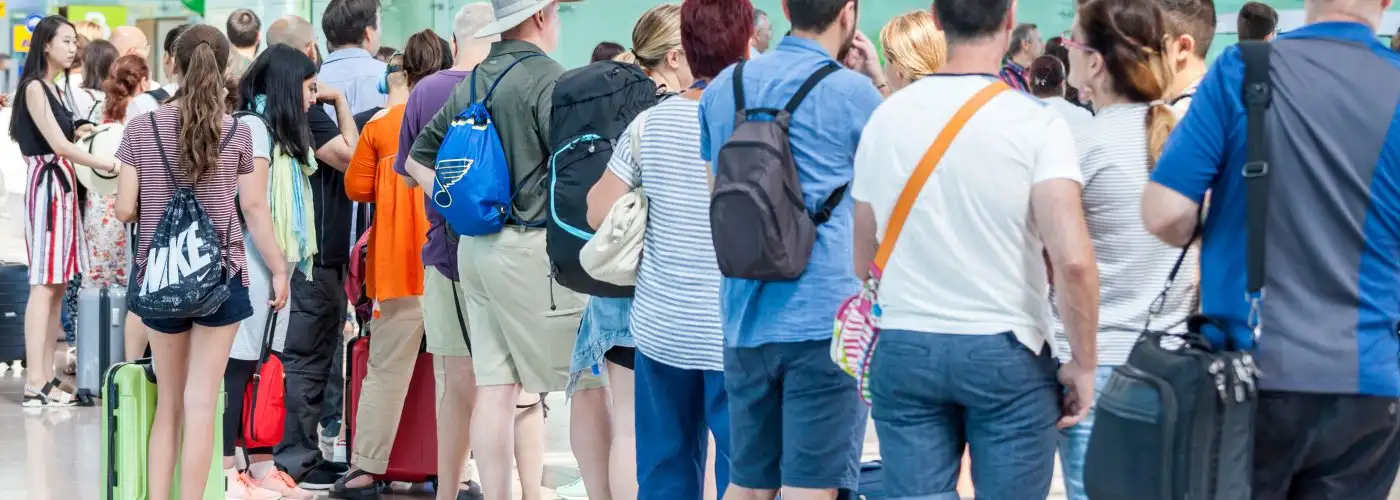Atlanta’s Hartsfield-Jackson International Airport, the world’s busiest, is back in business after being completely shut down for almost 11 hours between 1:00 p.m. and 11:55 p.m. on Sunday.
“Back in business” in this case includes the business of reaccommodating the thousands of travelers whose flights were canceled last night.
The cause of the electrical outage was a fire at one of the three Georgia Power substations at the airport. The entire airport was left without power.
Passengers on inbound flights were stranded on the tarmac for hours, as jetways couldn’t be deployed to transfer them to the terminal. Departing passengers were ushered this way and that by airline and airport workers whose efforts were uncoordinated and whose advice was often contradictory. There were no lights in the terminals. Elevators, escalators, and moving walkways were immobilized. Airport shops were unable to sell food or beverages to affected travelers. It was a mess.
The chaos overwhelmed airport authorities, Georgia Power, Delta, and local government officials, all of whom were left dissembling and prevaricating, if they could be bothered to comment at all. (Even in the middle of the shutdown, Georgia Power issued a news release assuring the public that “Georgia Power has many redundant systems in place to ensure reliability for the Airport and its millions of travelers—power outages affecting the Airport are very rare.”)
If one of the world’s largest, busiest airports is susceptible to such an outage, then any airport is. And while electrical outages are indeed rare, as Georgia Power suggests, weather and mechanical incidents are more frequent, and can cause similar travel disruptions.
What (if Anything) to Do
So, is there anything you can do to prevent such disruptions? No; they’re beyond your control.
Is there anything you can do to mitigate the effects of such disruptions, when they do occur? Not much.
While stuff happens, it doesn’t happen often enough to justify travel insurance. If you happen to have a credit card that comes bundled with flight-delay or cancellation insurance, fine. But extra-cost insurance isn’t worth it.
You can be prepared by having airline reservations and local hotel numbers available on your phone’s speed dial—although in the case of the Atlanta meltdown, there was apparently limited cell service.
In some cases, it behooves stranded flyers to leave the airport and check into a local hotel until the airline can confirm a seat on a departing flight. But in the Atlanta case, travelers had no idea whether they were facing temporary delays or outright cancellations.
In short, there’s little travelers can do to minimize the frustration and stress of flight disruptions, other than be mentally prepared for them (to minimize the initial shock), and remain calm and courteous when they do occur (to help keep the general level of air rage from escalating).
Reader Reality Check
Are you prepared for the next air-travel meltdown?
More from SmarterTravel:
- The Airlines That Serve the Healthiest (and Unhealthiest) Meals
- How to Snag a NYC Hotel for $100 per Night
- How to Minimize the Stress of Holiday Travel
After 20 years working in the travel industry, and 15 years writing about it, Tim Winship knows a thing or two about travel. Follow him on Twitter @twinship.
We hand-pick everything we recommend and select items through testing and reviews. Some products are sent to us free of charge with no incentive to offer a favorable review. We offer our unbiased opinions and do not accept compensation to review products. All items are in stock and prices are accurate at the time of publication. If you buy something through our links, we may earn a commission.
Related
Top Fares From
Today's Top Travel Deals
Brought to you by ShermansTravel
Shop and Save with Country Inns...
Patricia Magaña
 Hotel & Lodging Deals
Hotel & Lodging Deals
$229 -- Chicago: Discounted Rates and...
Francesca Miele
 Hotel & Lodging Deals
$229+
Hotel & Lodging Deals
$229+
$188 -- Honolulu: Save on Oceanview...
Abigail Lamay
 Hotel & Lodging Deals
$188+
Hotel & Lodging Deals
$188+




